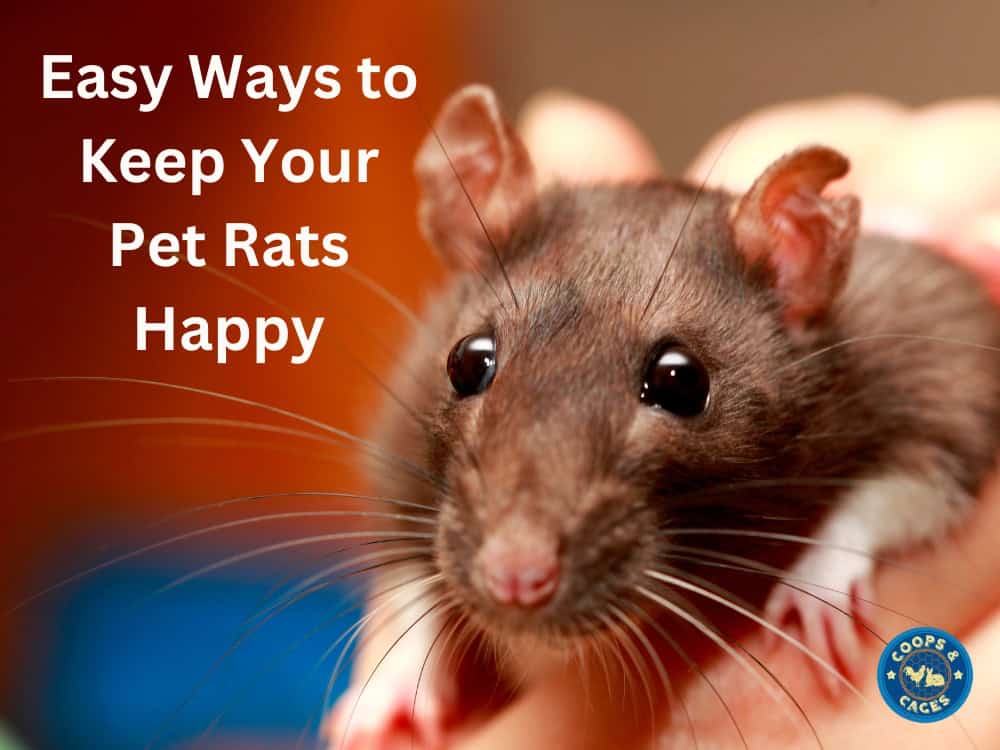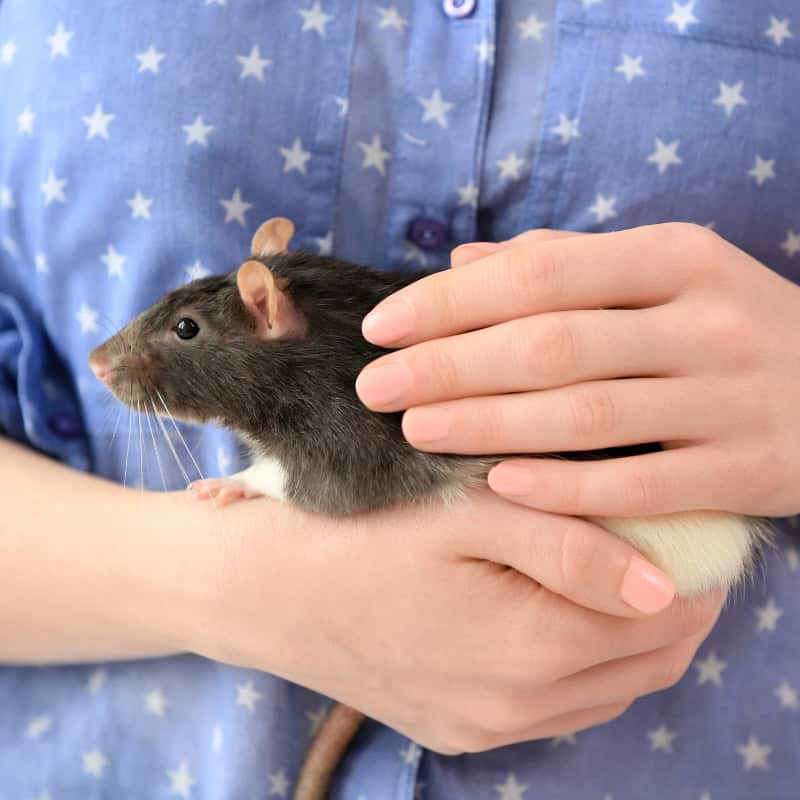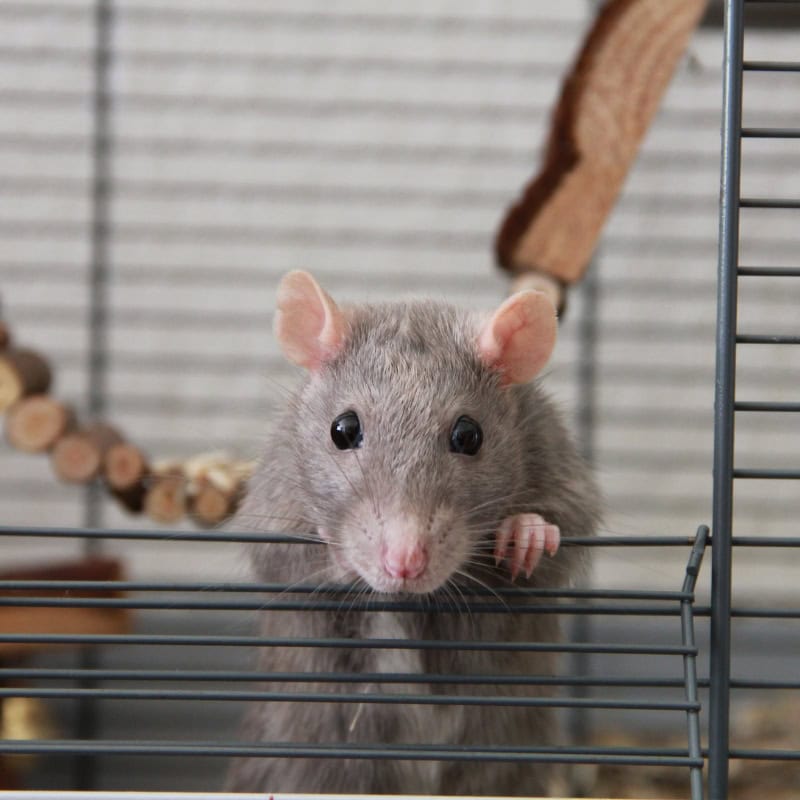Rats
Easy Ways to Keep Your Pet Rats Happy
Pet rats are intelligent, affectionate and social creatures that thrive with proper care and attention.
This blog covers essential aspects of rat care to ensure your furry friends lead a joyful and healthy life. From monitoring common health issues to providing a balanced diet, you’ll learn how to keep your rats in top condition. Discover tips on creating a stimulating and spacious living environment and the importance of spending quality time with your rats.
Follow our guide, and you’ll have happy, healthy rats that are a delight to care for.
Be Wary of Possible Health Problems
To keep your pet rats happy, maintaining their health is crucial.
Common health problems in pet rats include:
- Respiratory infections are particularly prevalent and can be severe if left untreated. Symptoms include sneezing, wheezing and laboured breathing.
- Tumours, both benign and malignant, are also common, especially in older rats. Regular vet check-ups can help detect these early.
- Parasites, such as mites and lice, can cause intense itching and discomfort. Maintaining good hygiene and regularly cleaning your rat’s cage can prevent infestations.
- Dental issues arise because a rat’s teeth grow continuously. Providing chew toys and a proper diet can prevent overgrown teeth and related complications.
To avoid these health issues, ensure your rats live in a clean environment. Clean their cage weekly, provide fresh bedding, and keep food and water dishes sanitised.
A balanced diet is vital; feed them a mix of high-quality rat pellets, fresh fruits and vegetables. Avoid sugary or fatty treats that can lead to obesity.
If you have any health concerns for your pet rat, book in a visit with your local vet.
Feed Your Rat Right
Feeding your rat the right foods is essential for keeping them happy and healthy. A well-balanced diet ensures your rat remains energetic, curious, and active.
The foundation of a healthy rat diet includes high-quality rat pellets or lab blocks, which provide essential nutrients.
Supplement their diet with fresh fruits and vegetables. Safe options include apples, berries, bananas, carrots, broccoli, and spinach. These not only provide vitamins and minerals but also add variety to their meals, preventing boredom.
Avoid foods that are harmful or lack nutritional value. Steer clear of sugary treats, chocolate, caffeinated products, and human junk food. Also, avoid feeding them citrus fruits, as they can cause kidney problems in male rats. Limit fatty foods, which can lead to obesity and related health issues.
Always provide fresh, clean water and ensure their food is stored properly to prevent contamination.
Provide Your Rat with a Happy Home
To keep your pet rat happy, providing a quality cage is essential. The cage should be spacious, allowing ample room for exploration and exercise. As a rule, aim for at least 60cm squared space per rat. But the more room you give them, the happier they will be!
Multi-level cages with ramps and platforms are ideal, as they mimic a rat’s natural climbing behaviour and increase the usable space.
Equip the cage with a variety of items to keep your rat entertained and stimulated. Include chew toys, tunnels, hammocks, and nesting materials. Rats love to burrow and hide, so providing small boxes or igloos can make them feel secure.
Choose a metal cage so the rats can’t chew on the bars. Avoid timber hutches as they will be chewed up quickly and glass tanks as they don’t offer enough ventilation.
Make sure the bars are closely spaced as rats can squeeze through small spaces. Bar gaps under 1.25cm will keep all rats in.
Here at Coops And Cages, we offer three varieties of metal rat cages that are perfect for larger pet rats. These cages are designed with your pets’ needs in mind, ensuring they have a safe and comfortable home.
Spend Time with Your Rat
Spending time with your pet rat is essential for their happiness and overall well-being. Rats are social animals that bond strongly with their human companions, enjoying interaction and playtime.
Regularly handling your rat helps build trust and strengthens your bond. Gently petting them, allowing them to sit on your shoulder, or letting them explore a safe, enclosed space outside their cage are great ways to interact.
Engage your rat with interactive toys and activities. Puzzle toys, foraging games, and treat-dispensing toys can keep them mentally stimulated. Training your rat to perform simple tricks using positive reinforcement not only provides mental stimulation but also deepens your connection.
Daily playtime outside the cage is important. Create a safe play area where your rat can explore new textures, climb on different surfaces and interact with you.
The more time you spend with your rat, the happier and more socialised they become.





